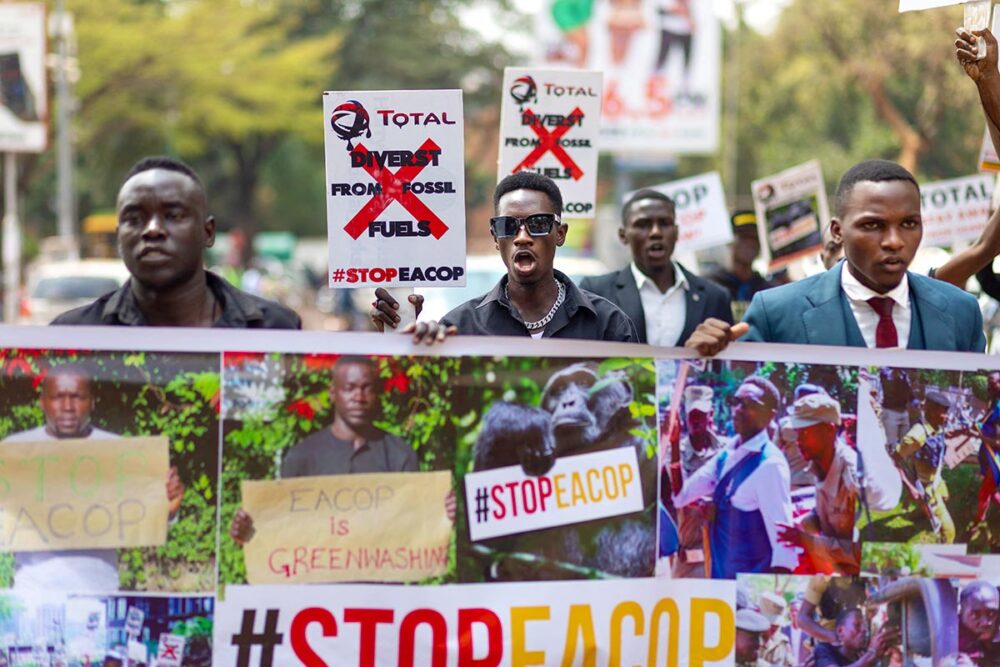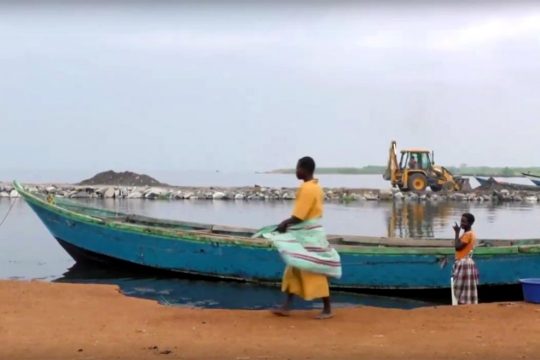Friday, December 8. A small group of women – one with a child strapped in her back – from Uganda’s oil rich region of Bunyoro sat with anxiety in a half empty court room in the city of Hoima, some 230 km south of Uganda’s capital Kampala.
A judge in full robes rummaged through volumes of paper work and uttered to the lawyers in English, a language alien to them. The women who came with their husbands to the court room and travelled in the morning some 140 km from their rural home in Buliisa district, often asked the help of a man to keep abreast of what the judge was saying in English.
A top judicial official momentarily adjourned the session and called the lawyers, four representing the people affected by the project under Oil giant, TotalEnergies – which is constructing the Oil central processing facility and 1,443km oil pipeline linking Uganda’s Albertine region to Tanzania. Another lawyer, Sam Tusbira, representing the Uganda government senior legal advisor, the Attorney General, joined the defense in his chambers. About a dozen of the 42 households summoned to court did not have legal representation in the court, some ranging from lack of money to pay an attorney and transport fare.
During the adjournment, the women joined their husbands who equally appeared anxious, on a veranda outside court. Some unconsciously put their hands on their mouths while others crossed their hands around their chests in state of confusion, wonder and apparent despair.
After nine years of resistance
That Friday, the High court in Hoima was convening to hear a court case that Uganda’s Ministry of energy and mineral development filed against 42 households whose land in Buliisa district is being acquired for Tilenga oil project operated by Total Energies.
In the suit that had been filed just four days before the court session by the Attorney general, the ministry requested court for permission to deposit compensation for the 42 resistant households to leave their houses and enable the French oil group to carry out its projects.
The households have since 2014 rejected the compensation offered by the government over low, inadequate and unfair compensation, according to Dickens Kamugisha, the Chief executive officer of Africa Institute for Energy Governance (AFIEGO), a non-for profit organization fighting for the rights of the persons affected by the oil project in Uganda.
Land granted to petroleum activities
After over an hour of waiting, the court room burst back into life with the orderly officer shouting, “All rise”, to announce the entry of presiding Judge Jesse Byaruhanga before he firmly took his seat to deliver the verdict amidst total silence enveloping the chambers.
“The applicant (government) deposits in court the assessed respondents’ compensation in the sum of UGX945,780,675 (about USD252,000) for land in the villages of Uduk 1 and 2, Avogera, Kasinyi, Kisiimo, Ngwedo centre, Kisomere, Urubo, Kigwera, Kizongi, Kihambura, Bikongoro, Kabolwa, Serule A and Kirama in Buliisa district and Hanga, Kayere, Waaki and Rwamutonga in Hoima district, measuring approximately 59.674 acres forming part of the land earmarked for the Tilenga project and currently occupied by the respondents”, judge Byaruhanga ordered as muted murmurs were heard in the court room.
“The applicant (government) is discharged from any liability arising out of any claim and or action following the order sought” he added as murmurs increased. “The applicant is granted vacant possession of land described measuring 59.674 acres to conduct its petroleum activities thereon and in default, eviction order accordingly I doth issue”, the judge added as silence reigned in the court room before he left the chamber.
“Why acting so quickly?”
After this expeditious hearing, reactions were strong.
“This (ruling) wasn’t surprising, it was expected”, Jealousy Mugisa Mulimba, one of the parties sued and founder of Community Voice Planning organization, a civil society group, told Justice Info. “The case against us was filed at Hoima court on December 4, and a hearing date was set on December 8. Some of the 42 households that were sued were informed of the case against them yesterday. Many remain unaware that a case was instituted against them. Why is the judiciary acting too quickly, do they want to promote injustice?” he asked.
“This kind of quick fixing of cases without adequate notice to households has no place in the world. Further any kind of investments’ that do not prioritise the rights of project affected persons are useless and should be fought at all costs”, said Frank Muramuzi, the Executive Director of National Association of Professional Environmentalists, a local non-for profit.
“The ministry of energy’s actions are tainted with ill intentions and are aimed at denying the projected affected persons justice”, said Abdul Musinguzi, the program manager at Tasha Africa Research Institute, who have been fighting for the rights of the communities in Uganda’s oil region. “Lay men should not be ambushed and rushed to courts without being given adequate time to prepare. The judiciary should avoid being used”, Musinguzi added.
Same judge as in 2014
“Justice cannot be justice when there is no fair hearing”, Herbert Alinda, the lawyer representing 12 of the sued households told Justice Info. “Under the circumstances, we struggled to attend because if we had not appeared, the case was to be heard exparte” he added. But the judge was determined to deliver the ruling that day. “My clients are not opposed to the project but they are asking for a fair compensation”, Alinda said before cautioning, “remember we are fighting somebody who is bigger than we are”.
According to Alinda, each of the families are to receive various amounts depending on their size of land, the materials used in constructing the houses and the level of development on the land including crops. He says the valuation documents the court relies on in the latest order was for 2019 yet the value of land in the region has increased. “An issue we wanted to raise in court but we were not given the chance”, Alinda told Justice Info. “For example, if the valuation documents gave a household Uganda shillings 11 million (about USD 2.900) compensation, which the affected parties had contested in their case filed in 2014, and court gives an order based on the valuation documents of 2019, can the 11 million shillings given by court, buy land and build a house for a household now yet the price of land has gone up? Definitely not and this is the contention my clients are raising”, he added.
“In any case, some of my clients say they were disappointed but not surprised that the same judge who issued an order against them in an earlier court hearing, in Masindi in 2014, is the same judge that presided over the same order this time”, Alinda said. His clients, he added, have given him instructions to appeal the ruling in a higher court.
Uganda’s energy and minerals development minister, Ruth Nankabirwa Ssentamu told Justice Info the ruling was a positive development for the growth of the oil sector. “We welcome the ruling,” Nankabirwa said. “We could not do otherwise, other than going to court because as government we tried all avenues including sitting with the affected people disputing the compensation, we negotiated, some accepted, some few remained stubborn yet the country needs oil for development. The ruling now allow government to take over the land and opens the way for the project to continue unhindered”, she added.
Total Energies did not respond to Justice Info request for comment.
“The judiciary is on trial”
But for AFIEGOs Kamugisha, still, “the judiciary is on trial”. He said his organization helped the affected households to file case against the government over unfair compensation in March 2014, but “nearly 10 years later hearing of the case is yet to be concluded”. “Yet the case filed by the Ministry against 42 households is quickly heard”, he added.
“The oil project affected persons, most of them are illiterate, very poor, some failed to raise transport fares to attend court and court processes are alien to them. Rushing such a case with human rights implications shows there are some people who want to take advantage of the judiciary to deny these people the right to their livelihoods” says Tasha’s Musinguzi.
“We did not think the 42 households received justice. Literally the judge should not blow his own trumpet that he dispensed justice, but still the affected families and people around should see that justice been done” Musinguzi said to Justice Info. “If the principles of natural justice and the law of the land followed, we can consider that on record there was no ruling and we are appealing,” he added.








